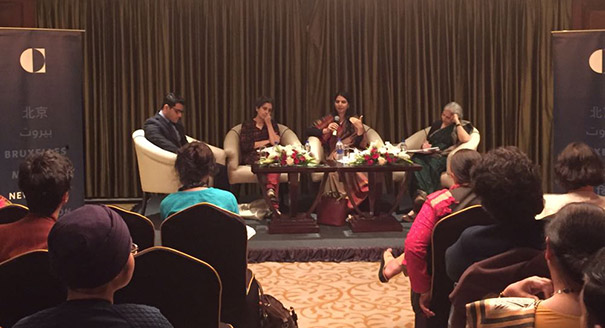Registration
You will receive an email confirming your registration.
Public debate around a universal basic income (UBI)—periodic and unconditional cash payments to all citizens—has grown significantly after the 2016-17 Economic Survey outlined such a scheme for India. Supporters claim that no-strings-attached payments will be an effective antidote to India’s underperforming antipoverty programs and leaky, distortionary subsidies. Critics worry that they will undermine an already-fragile social security architecture, cause workers to drop out of the labor force, and encourage wasteful spending.
In a new Carnegie India report, “India’s Universal Basic Income: Bedeviled by the Details,” Saksham Khosla examines the technical, administrative, and political feasibility of an Indian UBI. He will join Reetika Khera, Renana Jhabvala, and Yamini Aiyar for a discussion on the need for a UBI and its place in India’s social security architecture.
Discussion Highlights
- Basic Income Experiments: Participants noted that real-world experiments to test the effects of unconditional cash grants were conducted in Madhya Pradesh between 2011 and 2012. They reported that the cash grants were found to have positive impacts on the subjects’ welfare in terms of nutrition, healthcare, schooling and their overall living conditions. Apart from personal well-being, there was also a positive impact on the local economy, as beneficiaries with more disposable income were able to invest in procuring their own land and move out of agricultural labor. Further, participants added, marginalized groups like women and the elderly were empowered by direct cash transfers.
- Cash Versus Food: Participants discussed a nine-state survey undertaken to understand the beneficiary preferences for welfare benefits. They noted that respondents preferred food to cash transfers because of worries about inflation, misuse, and exploitation. Responses varied across states, however, depending on socioeconomic factors and the performance of existing food security programs.
- State Capacity and the Role of Politics: Participants noted that a UBI gives rise to a central issue: what is the welfare role of the state and to what extent should it intervene? They noted that a focus on cash transfers as a means for bypassing an inefficient state is erroneous, especially since the use of a such a tool demands a significantly more sophisticated state architecture. They also argued that, rather than developing and imposing technocratic steps in isolation, policymakers must also contend with the instrumental role of politics in welfare reform, given that a political consensus is likely to shape the design and purpose of a welfare state. Discussants emphasized that policy efforts should focus on bolstering the existing capacity of the state and investing in financial infrastructure and public service delivery.
- Path Forward: Participants discussed the potential of cash transfers in the form of pensions and maternity entitlements as being an affordable starting point for an Indian UBI, as well as the need for more pilot tests with state governments to both generate new evidence on the impact of a UBI and inform the politics around the issue. They also emphasized that the policy discourse on the topic needs to recognize that existing welfare programs have objectives beyond poverty reduction, such as creating local employment and building rural assets.
This event summary was prepared by Arushi Kumar, a research assistant at Carnegie India.
Agenda
6:00 p.m.
High Tea and Registration
6:30 p.m.
Introductory Remarks
Saksham Khosla
6:40 p.m.
Panel Discussion
Reetika Khera, Renana Jhabvala, Yamini Aiyar
Moderated by Saksham Khosla
Speakers
Reetika Khera
Reetika Khera is an assistant professor (economics) in the department of humanities and social sciences at the Indian Institute of Technology, Delhi.
Renana Jhabvala
Renana Jhabvala is the national coordinator for the Self-Employed Women's Association.
Yamini Aiyar
Yamini Aiyar is the president and chief executive of the Center for Policy Research.
Moderator
Saksham Khosla
Saksham Khosla is a research analyst at Carnegie India.
